How to write high-quality PHP code

Written for those newborn calves who are not afraid of tigers, you can read it at will. This chapter is based on PHP Laravel
Preface
People often ask
- How to design a directory better?
- How to distribute the code well?
- How to write a maintainable project?
I also write about "bad" projects. The following is based on the summary of articles and personal development experience of major Internet experts.
Controller
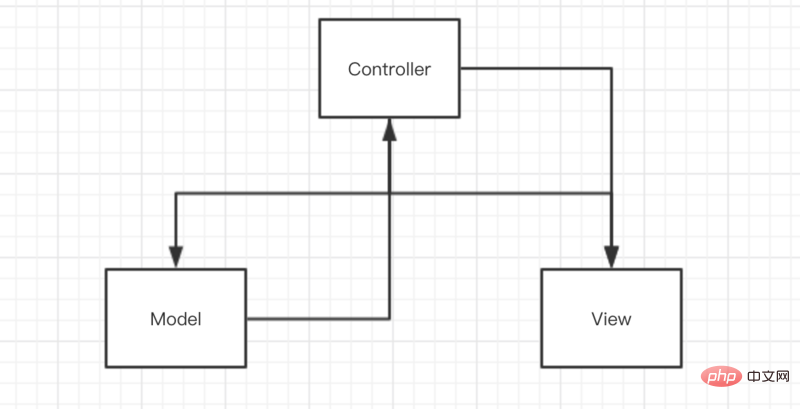
Controller, as the name suggests, is a controller. When you get started with PHP, you know that Controller represents the C layer in MVC. The concept of MVC itself is code separation, which teaches you how to separate businesses. However, as the business continues to develop, the complexity of the code also increases, and the links between functions are intricate. In the end, your MVC becomes As shown in the figure below, relying solely on the MVC design idea can no longer support the growing business.
Now we redefine the tasks and capabilities of the Controller. The controller only controls Http Reqeust requests, which complies with the SOLID single function principle.
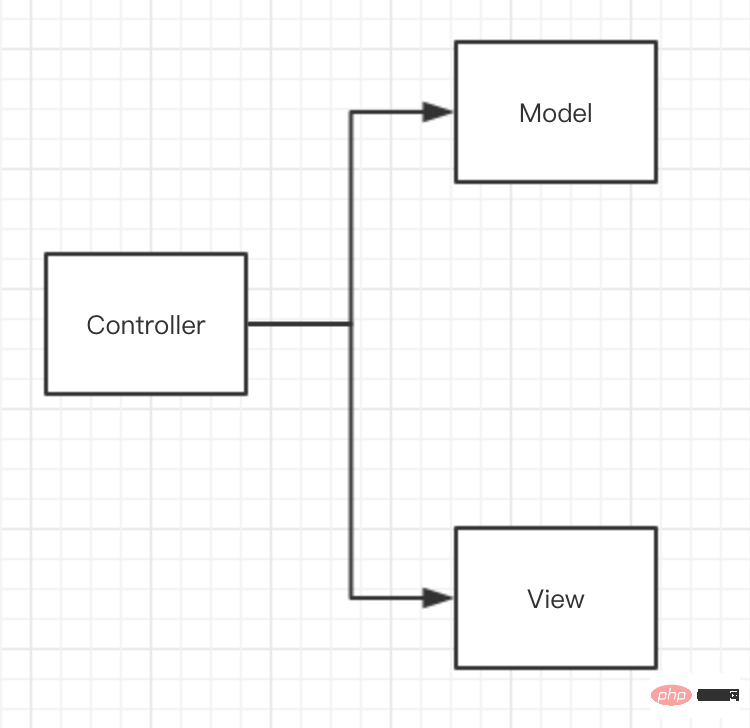
Writing business code directly in the Controller will make the code extremely bloated and difficult to maintain and expand
<?php namespace App\Http\Controller;
class UserController extends Controller{
public function register(Request $request){ $user = new User(); $user->username = $request->input('username'); $user->password = $request->input('password'); $result = $user->save(); return $result;
}
}复制代码At this time, we should think about how to separate the business code, and we introduce the concept of Service
Service
Service itself is translated as service
- Inject external methods and public methods into Service
- Inject Service into the controller
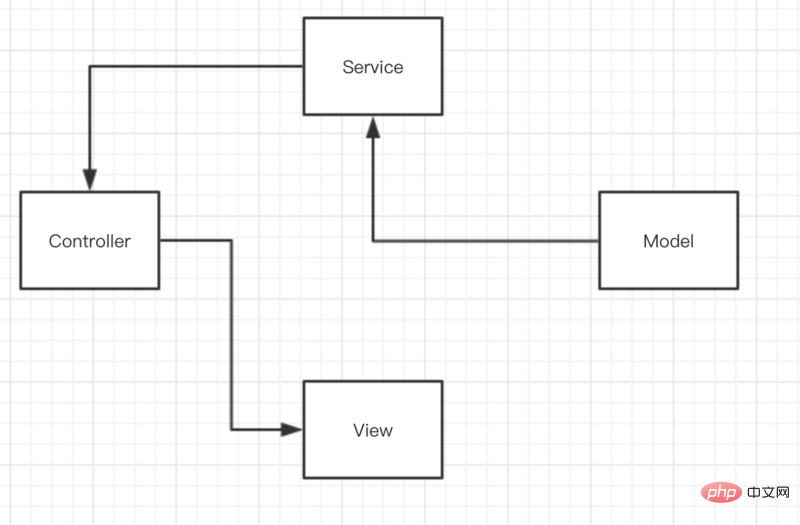
Like the picture above
UserController
<?php namespace App\Http\Controller;
class UserController extends Controller{
public $request;
protected $userService;
public function __construct(Request $request, UserService $userService)
{ $this->request = $request;
$this->userService = $userService;
}
public function register()
{
//... validation return $this->userService->register ($this->request->all());
}
}复制代码UserService
<?php namespace App\Service;
class UserService{
public function register($data)
{ $username = $data['username']; $password = $data['password'];
$password = encrypt ($password);
$user = new User(); $user->username = $username; $user->password = $password; $result = $user->save(); return $result;
}
}复制代码Until now , we at least completely separate the business from the requests. But it is still unsatisfactory. If all business and CURD are written in Service, it will just transfer the bloat of Controller to Service, and then Service will have no meaning in existence. Therefore, we need to continue to divide the Service and separate the R operations of the database, because the operations of CUD are basically the same, while the R operations become more colorful according to the complexity of the business. So standalone R operation. At this time we refer to the concept of Repository.
Repository
We use Repository auxiliary Model to encapsulate relevant query logic into different repositories to facilitate the maintenance of logic code
- Conforms to the single principle of SOLID
- SOLID-compliant dependency inversion
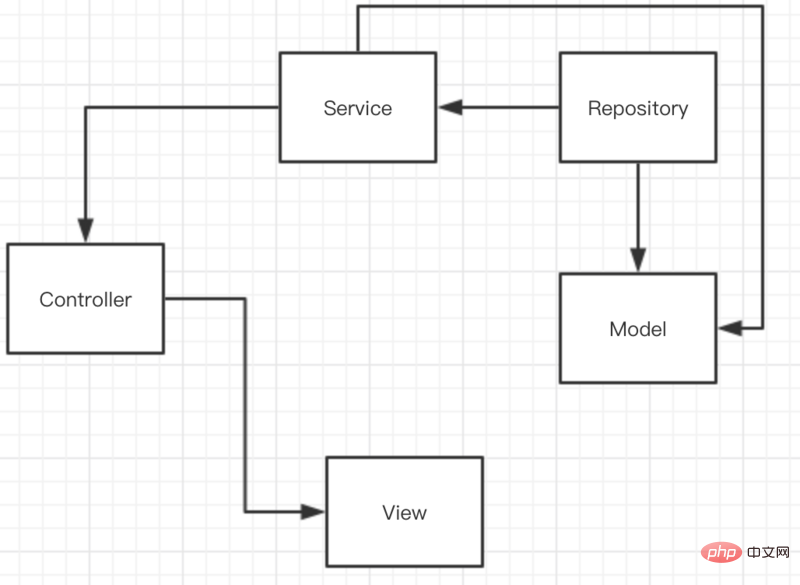
<?php namespace App\Http\Controller;
class UserController extends Controller{
public $request;
protected $userService;
public function __construct(Request $request, UserService $userService)
{ $this->request = $request;
$this->userService = $userService;
}
public function getUserInfo()
{
//... validation return $this->userService->getUserInfo ($this->request->all());
}
}复制代码Copy after login
UserService<?php namespace App\Http\Controller;
class UserController extends Controller{
public $request;
protected $userService;
public function __construct(Request $request, UserService $userService)
{ $this->request = $request;
$this->userService = $userService;
}
public function getUserInfo()
{
//... validation return $this->userService->getUserInfo ($this->request->all());
}
}复制代码<?php namespace App\Service;
class UserService{
public $userRepository;
public function __construct(UserRepository $userRepository){ $this->userRepository = $userRepository;
}
public function getUserInfo()
{ return $this->userRepository->getUserInfo($data);
}
}复制代码Copy after login
UserRepository<?php namespace App\Service;
class UserService{
public $userRepository;
public function __construct(UserRepository $userRepository){ $this->userRepository = $userRepository;
}
public function getUserInfo()
{ return $this->userRepository->getUserInfo($data);
}
}复制代码<?php namespace App\Repository;
class UserRepository{
public function getUserInfo($data)
{ $userId = $data['user_id']; $result = User::where('id',$userId)->first();
return $result;
}
}复制代码Copy after loginCopy after login
After solving the problem of R, someone asked, can it be put together because CUD is relatively unified and simple? The answer is NO, we quote a new noun Action. Action
<?php namespace App\Repository;
class UserRepository{
public function getUserInfo($data)
{ $userId = $data['user_id']; $result = User::where('id',$userId)->first();
return $result;
}
}复制代码This is what I learned after reading @Charlie_Jade’s articleIndependent of each operation file, such as CreateUser, DeleteUser, UpdateUser
- Conform to the single principle of SOLID
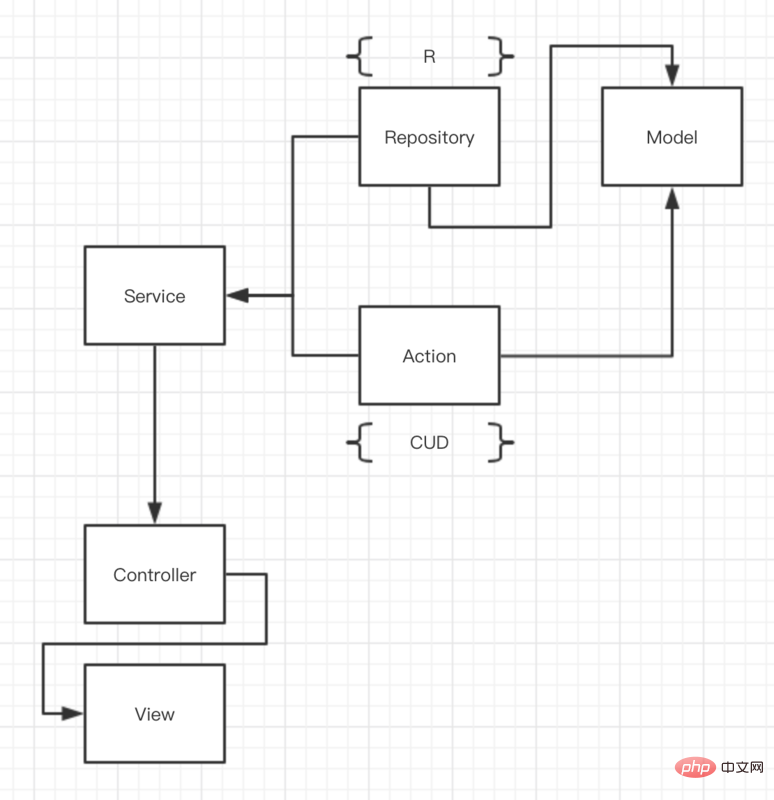
<?php namespace App\Http\Controller;
class UserController extends Controller{
public $request;
protected $userService;
public function __construct(Request $request, UserService $userService)
{ $this->request = $request;
$this->userService = $userService;
}
public function register(){
//... validation return $this->userService->register($this->request->all());
}
public function getUserInfo()
{ return $this->userService->getUserInfo ($this->request->all());
}
}复制代码UserService
<?php namespace App\Service;
class UserService{
public function getUserInfo(UserRepository $userRepository)
{ return $this->userRepository->getUserInfo($data);
}
public function register(){ $result = (new CreateUser())->execute($this->request->all());
return $result;
}
}复制代码UserRepository
<?php namespace App\Repository;
class UserRepository{
public function getUserInfo($data)
{ $userId = $data['user_id']; $result = User::where('id',$userId)->first();
return $result;
}
}复制代码CreateUser
<?php namespace App\Action;
use App\Model\Member;
class CreateUser extends CreateUserWallet
{
public function execute(array $data)
{ $models = new Member(); $models->tel = $data['tel']; $models->password = $data['password']; $result = $models->save ();
return $result;
}
}复制代码The above code logic is shown in the figure below
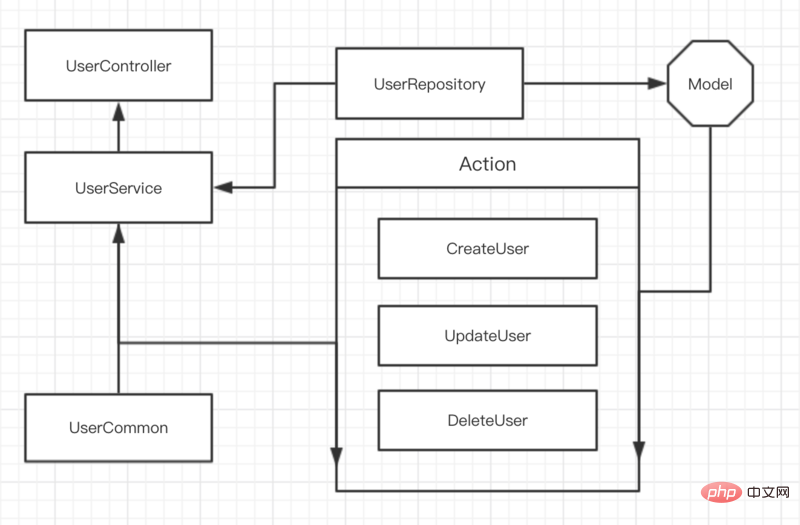
Common
is translated as public, commonly used. In some development, you may need some public methods (non-public classes, such as email sending, etc., it is not appropriate to use them), such as query User balance, query whether the user is registered or online, generate order number, etc. Using Common is even simpler. It is more like a public function library
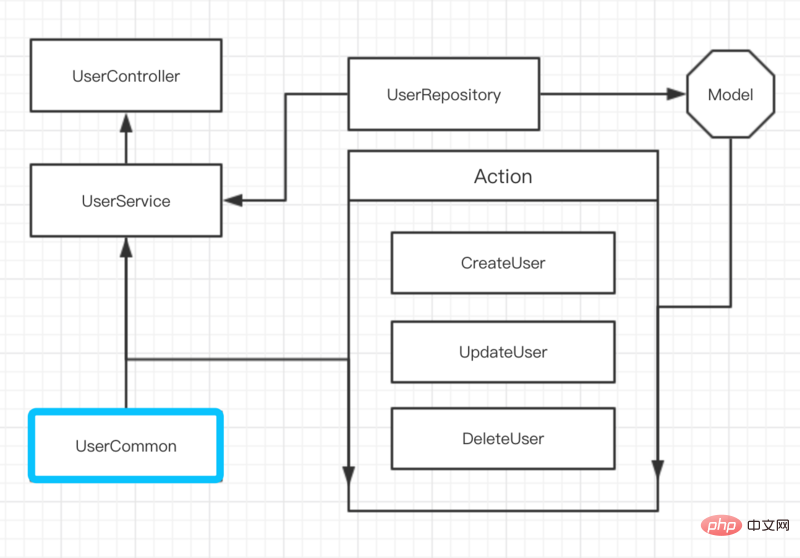
Event
You can choose to use it when you don’t care about the execution results, but the Listen of Event Queues are also provided.
Exception
Don’t use Return to return all your error messages. In many cases, your return may not be your return
Thank you
Thank you all After reading this article, if you have any new ideas, please feel free to discuss them in the comment area.
Recommended tutorial: "php tutorial"
The above is the detailed content of How to write high-quality PHP code. For more information, please follow other related articles on the PHP Chinese website!

Hot AI Tools

Undresser.AI Undress
AI-powered app for creating realistic nude photos

AI Clothes Remover
Online AI tool for removing clothes from photos.

Undress AI Tool
Undress images for free

Clothoff.io
AI clothes remover

AI Hentai Generator
Generate AI Hentai for free.

Hot Article

Hot Tools

Notepad++7.3.1
Easy-to-use and free code editor

SublimeText3 Chinese version
Chinese version, very easy to use

Zend Studio 13.0.1
Powerful PHP integrated development environment

Dreamweaver CS6
Visual web development tools

SublimeText3 Mac version
God-level code editing software (SublimeText3)

Hot Topics
 1377
1377
 52
52
 PHP 8.4 Installation and Upgrade guide for Ubuntu and Debian
Dec 24, 2024 pm 04:42 PM
PHP 8.4 Installation and Upgrade guide for Ubuntu and Debian
Dec 24, 2024 pm 04:42 PM
PHP 8.4 brings several new features, security improvements, and performance improvements with healthy amounts of feature deprecations and removals. This guide explains how to install PHP 8.4 or upgrade to PHP 8.4 on Ubuntu, Debian, or their derivati
 How To Set Up Visual Studio Code (VS Code) for PHP Development
Dec 20, 2024 am 11:31 AM
How To Set Up Visual Studio Code (VS Code) for PHP Development
Dec 20, 2024 am 11:31 AM
Visual Studio Code, also known as VS Code, is a free source code editor — or integrated development environment (IDE) — available for all major operating systems. With a large collection of extensions for many programming languages, VS Code can be c
 How do you parse and process HTML/XML in PHP?
Feb 07, 2025 am 11:57 AM
How do you parse and process HTML/XML in PHP?
Feb 07, 2025 am 11:57 AM
This tutorial demonstrates how to efficiently process XML documents using PHP. XML (eXtensible Markup Language) is a versatile text-based markup language designed for both human readability and machine parsing. It's commonly used for data storage an
 PHP Program to Count Vowels in a String
Feb 07, 2025 pm 12:12 PM
PHP Program to Count Vowels in a String
Feb 07, 2025 pm 12:12 PM
A string is a sequence of characters, including letters, numbers, and symbols. This tutorial will learn how to calculate the number of vowels in a given string in PHP using different methods. The vowels in English are a, e, i, o, u, and they can be uppercase or lowercase. What is a vowel? Vowels are alphabetic characters that represent a specific pronunciation. There are five vowels in English, including uppercase and lowercase: a, e, i, o, u Example 1 Input: String = "Tutorialspoint" Output: 6 explain The vowels in the string "Tutorialspoint" are u, o, i, a, o, i. There are 6 yuan in total
 Explain JSON Web Tokens (JWT) and their use case in PHP APIs.
Apr 05, 2025 am 12:04 AM
Explain JSON Web Tokens (JWT) and their use case in PHP APIs.
Apr 05, 2025 am 12:04 AM
JWT is an open standard based on JSON, used to securely transmit information between parties, mainly for identity authentication and information exchange. 1. JWT consists of three parts: Header, Payload and Signature. 2. The working principle of JWT includes three steps: generating JWT, verifying JWT and parsing Payload. 3. When using JWT for authentication in PHP, JWT can be generated and verified, and user role and permission information can be included in advanced usage. 4. Common errors include signature verification failure, token expiration, and payload oversized. Debugging skills include using debugging tools and logging. 5. Performance optimization and best practices include using appropriate signature algorithms, setting validity periods reasonably,
 7 PHP Functions I Regret I Didn't Know Before
Nov 13, 2024 am 09:42 AM
7 PHP Functions I Regret I Didn't Know Before
Nov 13, 2024 am 09:42 AM
If you are an experienced PHP developer, you might have the feeling that you’ve been there and done that already.You have developed a significant number of applications, debugged millions of lines of code, and tweaked a bunch of scripts to achieve op
 Explain late static binding in PHP (static::).
Apr 03, 2025 am 12:04 AM
Explain late static binding in PHP (static::).
Apr 03, 2025 am 12:04 AM
Static binding (static::) implements late static binding (LSB) in PHP, allowing calling classes to be referenced in static contexts rather than defining classes. 1) The parsing process is performed at runtime, 2) Look up the call class in the inheritance relationship, 3) It may bring performance overhead.
 What are PHP magic methods (__construct, __destruct, __call, __get, __set, etc.) and provide use cases?
Apr 03, 2025 am 12:03 AM
What are PHP magic methods (__construct, __destruct, __call, __get, __set, etc.) and provide use cases?
Apr 03, 2025 am 12:03 AM
What are the magic methods of PHP? PHP's magic methods include: 1.\_\_construct, used to initialize objects; 2.\_\_destruct, used to clean up resources; 3.\_\_call, handle non-existent method calls; 4.\_\_get, implement dynamic attribute access; 5.\_\_set, implement dynamic attribute settings. These methods are automatically called in certain situations, improving code flexibility and efficiency.




